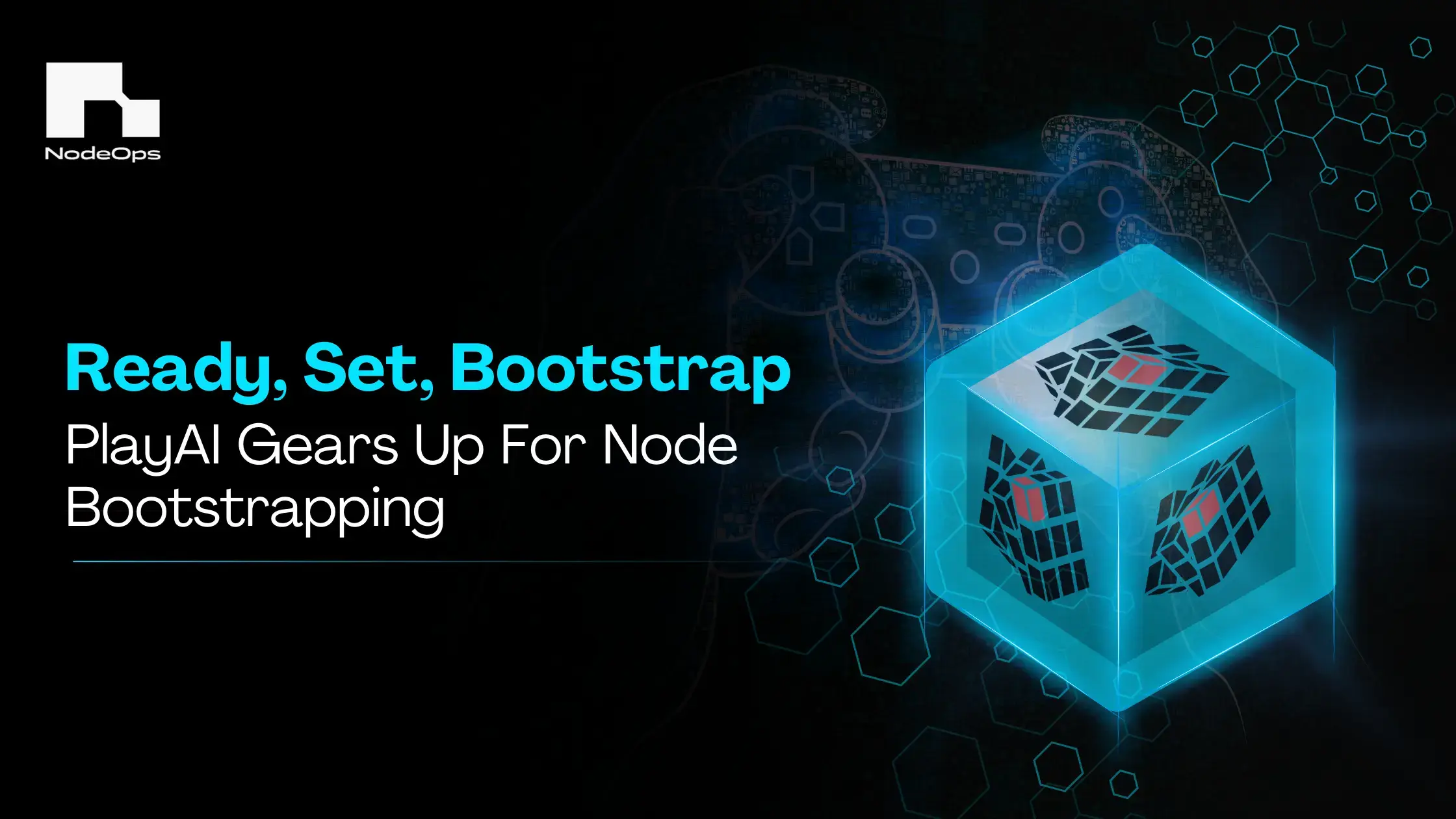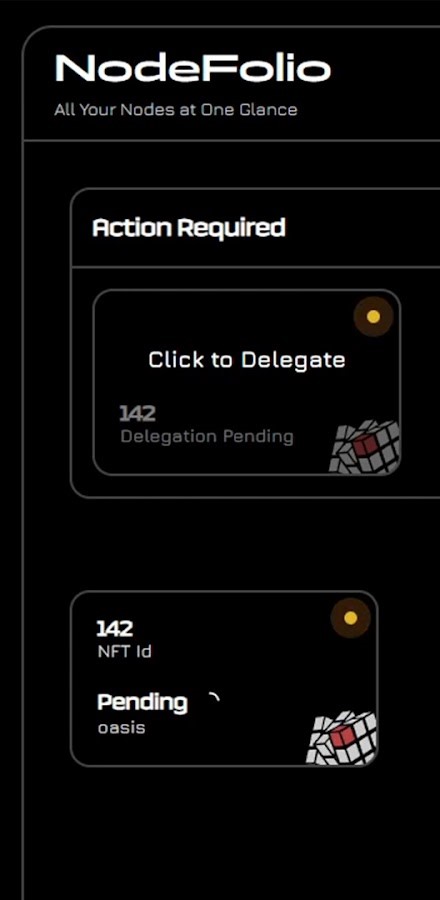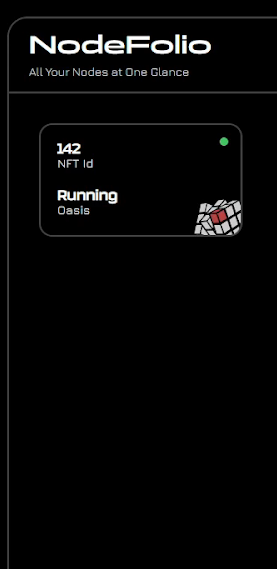Ready, Set, Bootstrap – PlayAI Gears Up For Node Bootstrapping
 NodeOps
NodeOps
Following the success of iAgent’s Node Bootstrapping, NodeOps is thrilled to announce the next project in line – PlayAI. With PlayAI, we bring exciting opportunities for developers, gamers, and community members.
But what exactly is PlayAI, and how does this partnership contribute to the ecosystem? Let’s find out.
Know All About PlayAI
Source | PlayAI: an orchestration layer for consumer intelligence
PlayAI serves as an orchestration layer for consumer intelligence and is shaping the future of gaming and artificial intelligence (AI). Its modular infrastructure simplifies data coordination and processing. It allows developers to build and train AI models on complex datasets across gaming, medical, and other sectors that fuel scalable and efficient AI solutions.
PlayAI network is powered by the PlayAI Chain, Oasis Nodes, and PlayAI Stack, which provide a robust platform for data processing and AI model development. It helps to democratize AI for consumer applications and create a collaborative and interoperable open-source environment where developers can create, share, and deploy AI models permissionlessly.
PlayAI is reshaping consumer applications by making them more intelligent and data-driven. The platform provides access to valuable datasets, incentivizes stakeholders, and equips developers with advanced tools for data analysis. PlayAI offers personalized experiences across industries by turning data into a powerful catalyst.
What are Oasis Nodes?
Oasis Nodes help in data coordination within the PlayAI network. These nodes enable functions like off-chain computation, data processing, and evaluation. They also manage the performance and integrity of various AI models. Oasis Nodes determines the efficiency and security of the PlayAI ecosystem and incentivizes the participants for their contribution. Oasis Nodes will be able to handle more complex operations and tasks as the network continuously expands.
The participants who operate Oasis Nodes are the key players in securing this ecosystem. They ensure the network runs smoothly and maintain performance standards in exchange for rewards – $PLAI, PlayAI’s native token.
Here’s what Oasis Nodes do:
Data processing: Oasis Nodes collects raw data from users, sensors, and applications for AI model training. They create well-structured data with better quality and accuracy for AI model development.
Computing: The nodes can perform off-chain computation tasks like AI model training and parameter optimization and maintain high performance without overloading the blockchain. Oasis Nodes also validate AI models against datasets for accuracy and reliability. Distributed computation helps nodes to collaborate and handle large-scale tasks more efficiently.
Rating: These nodes can access the quality of AI models and data, meaning – only those data that are highly accurate and reliable are used for training AI models and analysis. They use a slashing mechanism to address inaccurate data processing, reinforcing high-quality data and improving AI models throughout the ecosystem.
PlayAI will soon launch its Oasis Nodes via Node Bootstrapping event powered by NodeOps. Unlike traditional nodes set up with long waiting periods between the sales, deployment and rewards, Node Bootstrapping allows users to set up their nodes and deploy them quickly. Node operators can start earning rewards from day one, making it a great opportunity to participate and contribute to the PlayAI ecosystem.
Save the Date
The power of community participation can be seen in NodeOps Governance. The voting for the PlayAI launch proposal ended on October 9th, 2024 (Wednesday), at 5:30 pm (IST), and the project was passed with 95% positive votes from the members.
You can now be among the first ones to bootstrap your nodes—get ready for the official launch on October 14th, 2024.
How to Purchase and Delegate Your PlayAI Oasis Node
Step 1: Sign In to the NodeOps Console
Begin by signing into your NodeOps account to access the NodeConsole.
Step 2: Navigate to the Node Bootstrapping Event Page
Once signed in, go to the Node Bootstrapping Event Page to find the PlayAI Protocol listed.
Step 3: Connect Your Wallet
Connect your EVM-compatible wallet. This wallet will hold your PlayAI Oasis NFT, which operates on the Base blockchain.
Step 4: Select Nodes and Choose Deployment Option
Choose the number of nodes you'd like to purchase, then select one of the following deployment options:
Option 1: Purchase and Deploy Let us handle node operation, including monitoring, updates, and maintenance. This option removes all the technical complexities of node management.
Option 2: Purchase Only If you prefer to manage and operate your node independently, choose this option.
Note: If you select Option 1*, you will also need to specify the duration of your node operation.*
Step 5: Apply Promo Code (If Applicable)
If you have a promo code, enter it now and click "Apply."
Step 6: Complete Payment
Click “Pay” to start the payment process. You’ll be redirected to CopperX, our payment partner, to complete your subscription using your preferred blockchain.
Node Delegation
Step 7: Delegate Your Node
Once the payment is confirmed, you will be redirected to Nodefolio. A unique node will be created for you. To initiate delegation, click "Click to Delegate."
Ensure you connect the same wallet containing your PlayAI NFT that you used during the purchase. Delegation takes place on the Base Sepolia network, so you'll need some ETH on Base Sepolia for gas fees. You can obtain free ETH from a faucet like Alchemy Faucet.

Step 8: Confirm Setup
Congratulations! Your PlayAI Oasis Node is now set up. Return to NodeFolio to see your node's status change from "Click to Delegate" to "Running."

For any assistance or troubleshooting, please refer to our support resources or contact our help desk.
PlayAI Tokenomics and Tiers
By deploying PlayAI’s Oasis Nodes via the NodeConsole, participants can earn rewards from both PlayAI and the NodeOps ecosystem.
The total supply of $PLAI tokens is 1,000,000,000. The reward distribution plan has been laid out carefully, and here’s a breakdown:
Team: 15% (150,000,000 $PLAI tokens) with a 1-year cliff and 4-year vesting period.
Advisors: 5% (50,000,000 $PLAI tokens) with 1-year cliff. The vesting period for Seed Round Advisors is 3 years and for Strategic Round Advisors is 2 years.
Investors: 25% (250,000,000 $PLAI tokens), which is further divided into:
Seed Round: 11.5% (115,000,000 $PLAI tokens) with 0% unlock at TGE, 1 year cliff, and 3 years vesting period.
KOL & Strategic Round: 5% (50,000,000 $PLAI tokens) with 5-10% unlocked at TGE, 6 to 12 months cliff, and 2 year vesting period.
Exchanges & MMs: 8.5% (85,000,000 $PLAI tokens) with 5-10% unlocked at TGE, upto six months of cliff and 2 year vesting, if applicable.
Ecosystem Rewards: 20% (200,000,000 $PLAI tokens) with node sale rewards and 3-year vesting (on monthly basis).
Airdrops: 7% (70,000,000 $PLAI tokens) with 3% unlocked at TGE and daily vesting over three months.
Community & Marketing: 10% (100,000,000 $PLAI tokens)
Ecosystem Development Fund: 10% (100,000,000 $PLAI tokens)
Reserve Fund: 8% (80,000,000 $PLAI tokens)
Users can easily calculate their reward potential with the help of the Rewards Calculator. Simply adjust the key parameters like Node Licenses, Token FDV, Number of Nodes Operated, and Average Node Cost to calculate the total rewards from Airdrop allocation.
Please note that the supply for community and marketing, ecosystem development and reserve funds will be locked until the launch and will be used as needed for strategic initiatives.
Participants can also earn NodePoints from NodeOps for every dollar spent and for participating in proposals voting and node deployment.
Check out the tier structure and node allocation for NodeOps, along with the pricing:
Disclaimer: The rewards outlined are estimates based on optimal conditions and average projections. Actual rewards may vary depending on several factors, including node uptime, participation in network activities, contribution across data verification and validation, and other variables that can influence overall performance.
About PlayAI Network
PlayAI is the first modular chain for AI in gaming, designed to enable developers with quality gaming data, deploy AI agents and models, and reward users for their data contributions. By harnessing the decentralized nature of web3, PlayAI aggregates data and fosters collaboration to create Gaming AI models. It is building the Intelligence Layer for hyper-personalized, immersive gaming experiences.
Recently, PlayAI raised $4.3M in VC funding from investors like Polygon Ventures, Jump Crypto, Alphawave, Zentry, MH Ventures and announced one of their biggest partnerships yet with Movement Labs.
You can join our vibrant community of over 50,000 members on Discord. Visit us for more information on consumer intelligence at playai.network and follow us on X for the latest news and updates!
About NodeOps
NodeOps is the leading infrastructure marketplace for Web3, allowing anyone to purchase, deploy and manage a wide range of blockchain nodes. Our mission is to truly decentralize Web3. One node at a time. To achieve this, we are streamlining the entire node orchestration process and offer an easy-to-use platform for Web3 protocols, developers and retail users to manage all their operational needs. With Atlas—our permissionless, decentralized infrastructure orchestration layer built as an AVS on EigenLayer—we're setting new standards in ease, speed, and security for infrastructure management. We support over 45 chains, created 28,800+ NodeFolios, deployed 45,900+ nodes, and manage assets worth $58.2 million (AUM).
Join NodeOps today and deploy your first node at nodeops.xyz, or follow us on X for the latest news & updates.
Subscribe to my newsletter
Read articles from NodeOps directly inside your inbox. Subscribe to the newsletter, and don't miss out.
Written by
